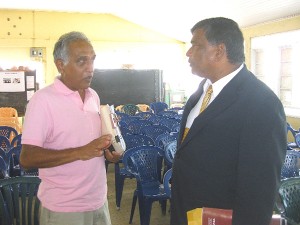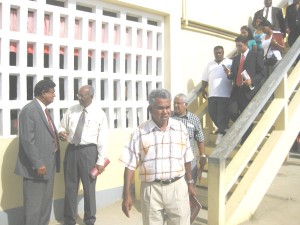– CLICO bonds purchase still a troubling issue
The Concerned Members of the New Building Society (NBS) group has been successful in getting the society’s Board of Directors to agree to limit the new proposed lending ceiling to $12 million; set up a loans sub-committee and liquidate its pounds sterling investment so that it may be reinvested in an aligned currency.

However, at the end of the NBS Annual General Meeting (AGM) yesterday, Chartered Accountant Christopher Ram, a member of the group, told the media gathered outside the venue that he was disappointed that NBS did not properly address the question of asset concentration.
He said the issue was not whether the investment in the Berbice River Bridge is good but rather it is a question of “putting too many of our eggs in one basket and that is what has happened.”

He said the NBS did not have a financial analyst or an accountant on its board and lamented that that is clearly irresponsible. “You don’t make investments of $1.5 billion by round robin…,” he said, pointing out that Chairman of the Board Dr Nanda K. Gopaul had admitted that this was done. The $1.5 billion was used to purchase bonds in the Berbice Bridge Company Inc (BBCI) from the ailing CLICO (Guyana).
Responding to this Gopaul told the NBS members gathered at the Cotton Tree Primary School that the investment “is safe, secure and sound.”

He said too that it was “wise to invest in what can be considered a monopoly” and that the board was monitoring the progress of the bridge. He said they “have nothing to fear and nothing to lose from the investment” which would earn double what it could have earned at the commercial banks.
Ram lamented that NBS did not seek its auditors’ advice on the matter nor did it seek to protect the pension fund. He pointed out that the chairman avoided the question as to the pension fund’s loss of $111 million.
Ram said he would like to see the society demanding very early, a copy of the audited financial statement of the BBCI. He feels that as a public-interest type company the BBCI should publish at least half-yearly, if not quarterly reports.
One of the agenda items at the AGM was a resolution to raise the NBS’s loans ceiling from $10 million to $12 million or such other sum as may be approved by the board. The concerned members objected to any increase beyond $12 million as it would be unusual to endow such unprecedented power on the board and noting that in all financial institutions there are prescribed limits at various levels of authority. The directors supported the amendment by the concerned members that the loan ceiling be raised from $10 million to $12 million, pending approval of the minister of finance.
In addition, the board and the meeting agreed that a loan sub-committee shall be set up and that Ram and NBS Director Secretary Ahmed M. Khan would work on a framework for its operation, including terms of reference.
With regard to the NBS’s UK pound sterling quoted investment, the board and the meeting agreed that it would be liquidated and invested in a currency to which the Guyana dollar is more aligned, including the Guyana dollar. This means that the investment may well be repatriated.
It was also agreed that Ram will work with the NBS on this and that it would be done in three months or such other reasonable tike to ensure a smooth liquidation of the assets.
Ram told the media that there are clearly serious governance problems –
which the Bank of Guyana has found – within the society and he was disappointed that the meeting did not take questions on those issues.
Part of the problem of governance, Ram said is that the board has seven directors as stipulated by the act but “none of them would want to push anybody off… so we are stuck with that board for the foreseeable future – a board that does not have all the relevant skills and expertise a modern financial institution will require in these challenging times.”
He is hoping that as they look to streamline the governance arrangement that some of the procedures for management elections are the appointment of auditors.
He said a principal function of an audit committee is its relationship with the external auditor including the appointment or the firing.
According to Ram, what should have happened when a nomination was made
under section 16 of the act is that it should have been referred to the audit committee and asked what it would have liked on the matter.
He said that despite the fact that it was pointed out that the notice for change of auditors was improper and a suggestion made by Leslie Sobers on behalf of the concerned members that pursuing the issue in the manner in which the chairman proposed to deal with it was improper and unlawful the meeting still went ahead with it.
Management issues
Meanwhile, Governor of the Bank of Guyana (BOG), Lawrence Williams has
issued a letter to Chairman of the concerned group, Cyril Walker, saying that the BOG “has already taken steps to bring the NBS under its direct supervision” and that “some management issues” have been found.
Williams was responding to a letter dated April 17 sent by Walker that stated that the Annual Report had not been submitted to members even though the AGM was less than a week away. The group had said too “this is particularly troubling in the light of the reported substantial reduction in profits and an exchange loss of more than $200 million.”
The committee believes that the performance of the society cannot be separated from the quality of governance which is at an unprecedented low level, it said in a statement.
The committee said it believes that the board is taking advantage of its own refusal to be licensed under the Financial Institutions Act which would have brought some financial discipline to the NBS.
The letter by the governor stated, “The action taken by the bank has been endorsed by the authorities and the necessary legislative changes to give effect to a prudent regulatory regime are being drafted.
“Until such time as the legislative changes are enacted the bank will continue to engage the NBS on general issues of safety and soundness through authorized inspections and offsite surveillance.”
Further the letter pointed out that, “It is important to note that the bank has conducted several inspections of NBS upon the authorization of the Honourable Minister of Finance [Dr. Ashni Singh] in keeping with the NBS Act.”
The last inspection, according to the letter was on May 31, 2007. At the end of each inspection the findings have been communicated to the minister and the chairman of the board of directors.
It said too that “the findings of the inspections point to a healthy mortgage portfolio and general compliance with the NBS Act notwithstanding some management issues.”




